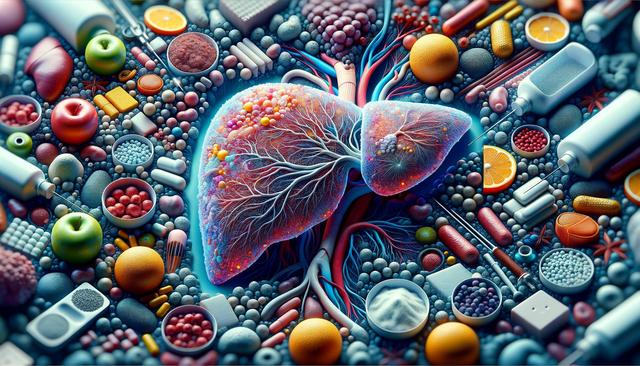Understanding Fatty Liver and Its Causes
Fatty liver, also known as hepatic steatosis, occurs when excess fat builds up in the liver. It’s a condition that can develop without noticeable symptoms, making it difficult to detect in early stages. There are two primary types: alcoholic fatty liver disease (AFLD) and non-alcoholic fatty liver disease (NAFLD). While the former is linked to heavy alcohol use, NAFLD is more common and often associated with obesity, insulin resistance, high cholesterol, and type 2 diabetes.
Understanding the root causes is key to healing fatty liver. Some contributing factors include:
- High intake of refined carbohydrates and sugars
- Low levels of physical activity
- Excess body weight, particularly around the abdomen
- Imbalanced lipid levels in the blood
Addressing these underlying issues is the first step toward improving liver health. Consulting a healthcare provider for blood tests, imaging, and a detailed diagnosis is essential to determine the extent of liver involvement.
Adopting a Liver-Friendly Diet
Diet plays a central role in managing and healing fatty liver. A nutrient-dense, balanced diet can reduce liver fat, improve insulin sensitivity, and support overall metabolic health. Focus on whole, unprocessed foods while avoiding ingredients that contribute to liver fat accumulation.
Consider the following dietary strategies:
- Increase intake of vegetables, especially leafy greens and cruciferous types like broccoli and kale
- Opt for whole grains like quinoa, oats, and brown rice
- Choose lean protein sources such as legumes, fish, and poultry
- Use healthy fats from nuts, seeds, avocados, and olive oil
- Limit added sugars, especially from sweetened beverages and desserts
Reducing saturated fats and avoiding trans fats can also help reduce liver inflammation. Meal planning and preparing food at home more often can support consistent healthy eating. It’s not just about what to eat, but also about staying hydrated and maintaining regular meal times.
Incorporating Regular Physical Activity
Exercise is a powerful tool for managing fatty liver disease. It helps reduce liver fat, supports weight management, and improves insulin sensitivity. Both aerobic and resistance exercises are beneficial, and consistency is more important than intensity for long-term success.
Here are some effective ways to stay active:
- Brisk walking for at least 30 minutes a day
- Cycling or swimming a few times per week
- Strength training exercises using body weight or light weights
- Yoga or stretching routines to improve flexibility and reduce stress
It’s important to start gradually, especially if you haven’t been active in a while. Setting realistic goals and tracking progress can help maintain motivation. A combination of movement and reduced sedentary time can significantly support liver health over time.
Managing Weight and Metabolic Health
Weight loss is one of the most effective ways to reduce fat in the liver, particularly in individuals with NAFLD. A modest reduction of 5-10% of body weight can result in significant improvements in liver enzyme levels and inflammation. However, rapid weight loss should be avoided as it can worsen liver function.
Key approaches to sustainable weight loss include:
- Setting measurable and achievable goals
- Combining dietary changes with consistent physical activity
- Monitoring portion sizes and eating mindfully
- Limiting high-calorie, nutrient-poor foods
In addition to weight management, monitoring metabolic markers like blood sugar, triglycerides, and cholesterol is crucial. These factors often go hand in hand with fatty liver and can be managed with a combination of lifestyle changes and, if needed, medical support.
Reducing Liver Stress and Building Healthy Habits
Beyond diet and exercise, other lifestyle factors can influence liver health. Chronic stress, poor sleep, and exposure to environmental toxins may contribute to liver strain. Building routines that support overall wellness can aid in the healing process.
Consider integrating the following habits:
- Getting 7-9 hours of quality sleep per night
- Practicing stress management techniques like meditation or journaling
- Avoiding unnecessary medications or supplements that may burden the liver
- Reducing alcohol consumption or eliminating it entirely
Regular check-ups with your healthcare provider can help monitor your progress and make necessary adjustments. Support from registered dietitians or lifestyle coaches may also provide added accountability and guidance.


